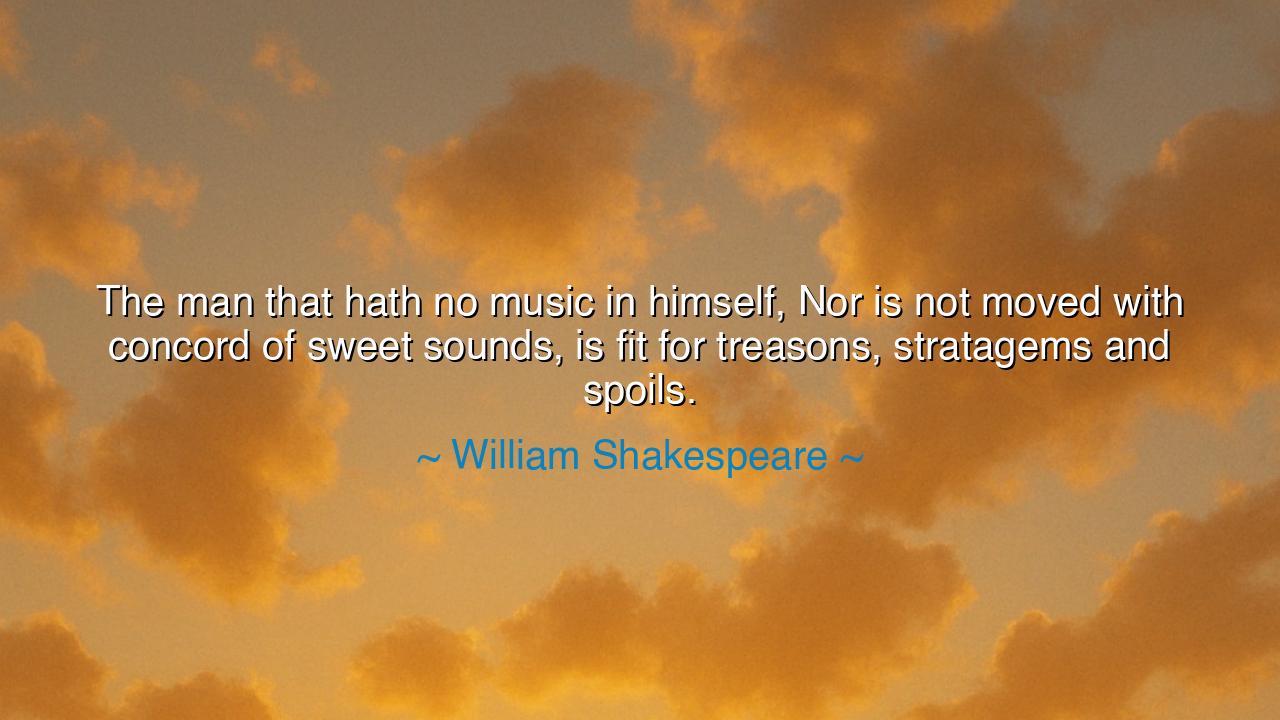
The man that hath no music in himself, Nor is not moved with
The man that hath no music in himself, Nor is not moved with concord of sweet sounds, is fit for treasons, stratagems and spoils.






Hear the timeless words of William Shakespeare, who in the play The Merchant of Venice declared: “The man that hath no music in himself, nor is not moved with concord of sweet sounds, is fit for treasons, stratagems and spoils.” These words are not idle poetry, but a mirror held up to the soul of mankind. For music is not merely a craft of tones and instruments—it is the echo of harmony within creation itself. He who feels nothing when bathed in its beauty, Shakespeare warns, is a soul unanchored, a heart estranged from goodness, and thus easily drawn into deceit, betrayal, and ruin.
For what is music but order made audible, the joining of discord into harmony, the breath of creation expressed in sound? When a man hears music and is stirred, it shows that his heart still recognizes truth, that he is still tethered to the beauty and balance that undergird the world. But when he has no music within—no tenderness to be moved by beauty, no spark to be stirred by harmony—he is as stone, cold and unyielding. Such a heart can scheme treachery without remorse, for it no longer knows the sweetness of concord.
Consider history’s examples. Think of the tyrants who wrought terror upon the earth—men who saw no beauty in the human soul, who heard no harmony in the cries of the oppressed. Their hearts were deaf to music, and thus they pursued only stratagems and spoils. In contrast, see the life of Frederick Douglass, who once said that hearing the sorrow songs of enslaved people first awakened his mind to the depth of their suffering and the greatness of their spirit. Music became the truth that pierced his heart and stirred him toward freedom and justice. Truly, those moved by sweet sounds are also moved by compassion, for they know the resonance of the human soul.
Shakespeare’s wisdom lies also in this: music is not only heard with the ear, but with the spirit. It is not enough to play notes or hum tunes; the deeper call is to cultivate an inner harmony, a balance within the self. The man who hath no music in himself is not only one deaf to melody, but one who has neglected to tune the strings of his own soul. For when the inner strings are out of tune, discord reigns, and from discord arises betrayal, cruelty, and strife.
And yet, even in darkness, music restores. Recall the prisoners of war in camps who sang together in defiance of despair, finding strength in shared songs. Recall also the great composer Beethoven, who though struck deaf in body, still heard music within himself, and through it poured forth symphonies that endure across centuries. These stories reveal the truth: he who nourishes music within, even in silence or suffering, keeps his spirit whole and invulnerable to treachery.
The lesson, then, is this: guard the music within you. Let yourself be moved by beauty, by harmony, by the songs of life both simple and profound. If you feel hardened, seek out music that stirs your soul, for it will soften your heart and restore your humanity. To despise music, or to close your heart against it, is to risk falling into bitterness and treachery, blind to the concord that binds us together.
Practical actions follow. Listen daily to sounds that uplift: a song of hope, a hymn of praise, the gentle music of nature itself—the rustling of leaves, the flowing of rivers, the chorus of birds. Learn to sing, or to play, or simply to sit in stillness and allow your heart to be tuned. Above all, nurture harmony in your words and deeds, for this too is music, the music of a life well lived.
Thus let the words of Shakespeare endure as a warning and a guide: He who has no music within himself is fit for treachery; but he who cultivates harmony within shall be a bearer of peace, of joy, and of truth across all generations.






AAdministratorAdministrator
Welcome, honored guests. Please leave a comment, we will respond soon